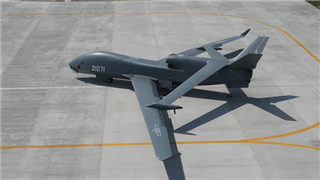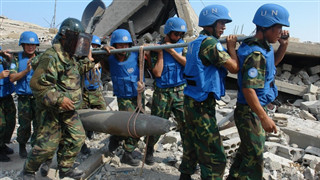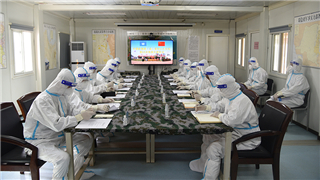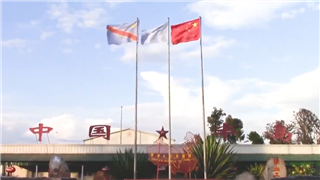
Migrants sit on the ground as they gather near Poland - Belarus border in Grodno District, Belarus, in this still image taken from a social media video on Nov 9, 2021. [Photo/Agencies]
Minsk denies West's claim of directing flows as Berlin calls on EU to do more
WARSAW-EU and NATO member Poland on Monday said it had repelled an attempt by hundreds of migrants, mainly from the Middle East, to "illegally cross" the border from Belarus. Thousands more were on the way, said a government spokesman who suggested that some might come with weapons.
The latest grim chapter of Europe's migrant crisis saw the United States call on Minsk to stop what it described as an orchestrated influx of migrants, while the European Union called for fresh sanctions against Belarus.
Belarusian President Alexander Lukashenko has denied the accusations leveled against his government by the West.
The Belarusian Defense Ministry called the allegations "unfounded and unsubstantiated" and accused Poland of "deliberately" escalating tensions.
Belarus border official Anton Bychkovsky told the country's BelTA news agency on Monday: "All these people, including women and children, do not pose a threat to security and do not behave aggressively.
"According to the refugees, they gathered together in such a large group to prevent their forced expulsion by Poland, as well as to draw the attention of the international community to nonobservance of human rights by Poland."
Polish police posted a video on Tuesday showing a group of migrants who had camped overnight just on the far side of Poland's eastern border in Belarus. Polish riot police and coils of razor wire faced the migrants and police said the situation overnight was calm.
Germany on Tuesday urged the EU to "take action" and help stem the flow of migrants illegally crossing into Poland from Belarus.
"Poland or Germany can't handle this alone," caretaker Interior Minister Horst Seehofer told the Bild daily.
As Poland's western neighbor, Germany has seen a steep rise in migrants entering from Belarus via Poland. In October alone, the number stood at nearly 5,000, according to German authorities. Berlin has responded by stepping up border controls and deploying extra police officers.
In a statement later on Monday, European Commission President Ursula von der Leyen called on member states to impose new sanctions against Belarus.
NATO also condemned Minsk, with the military alliance accusing the government there of using the migrants as political pawns.
Polish government spokesman Piotr Muller told reporters that at least 3,000 migrants were near the Polish border.
"We expect that there may be an escalation of this type of action on the Polish border in the near future, which will be of an armed nature," he said.
Poland has sent thousands of soldiers to the border area, enforced a state of emergency in the region complete with a media blackout, built a razor-wire fence and approved the construction of a wall.
At least 10 migrants have died in the region, seven of them on the Polish side of the border, according to the Polish daily Gazeta Wyborcza.
"We're prepared for any scenario," Poland's Interior Minister Mariusz Kaminski tweeted on Monday, adding that Warsaw had increased the numbers of police and soldiers in the area.
Russian facilities
In another development, an agreement on the deployment of two Russian military facilities on the territory of Belarus has been extended for 25 years.
Interfax reported that the Russian military facilities-the Russian Navy communications center Vileika and the radar station Volga-have been deployed in Belarus since 1995. Volga is part of the Russian missile warning system, and it covers the territory of Western Europe and the patrol areas of NATO submarines in the North Atlantic and the Norwegian Sea. The communications center Vileika provides long-wave communications in the Atlantic, Indian and partly Pacific oceans.
Russia and Belarus have a single regional air defense system. In October, the head of the Russian Federal Service for Military-Technical Cooperation, Dmitry Shugaev, said Moscow is ready to supply Minsk with the S-400 defense systems.











